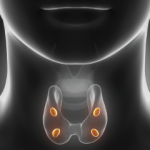SAN DIEGO—A hormone secreted by the parathyroid gland is both a builder and a destroyer of bone in humans, with important implications for a variety of conditions treated by rheumatologists. In the Oscar Gluck, MD, Memorial Lecture at the 2017 ACR/ARHP Annual Meeting Nov. 3–8, Henry Kronenberg, MD, chief of the Endocrine Division at Massachusetts…

